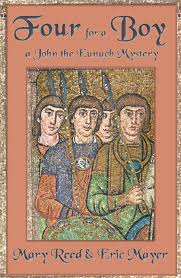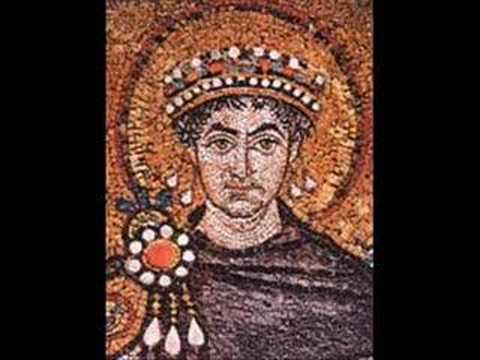The fourth in a series set in Sixth Century in the Constantinople of Justine and Justinian, emperors of Nova Roma. Our principal is John, whose mercenary background has brought him to Constantinople … a slave. He bristles at his status but makes the best of it.

Amid much palace intrigue John, as the Emperor Justin is passing the rule, reluctantly, to his nephew Justinian, is assigned to an excubitor. Felix, he from the Teutonic woods, to investigate the blatant murder of a rich citizen in a church. The Emperor Justine designates them, perhaps more to slow, than speed the investigation for John is after all a slave, and no citizen is required to speak to him. Felix has only a middle rank, poor Latin, and is not the sharpest knife in the drawer. The city’s Prefect resents their intrusion and fobs them off with other duties.
 Justinian.
Justinian.
On their fools’ errand, they go here and there in Constantinople from the Hippodrome to the Golden Horn, to the Bosphorus, to Constantine’s column, to the Great Palace. Each time I shout out, ‘I’ve been there!’
 Constantine’s column as it was and and it is today.
Constantine’s column as it was and and it is today.
Two such low level functionaries have little access to the great and good, and the few they meet are quick to tell them that. But they do have more access to the panoply of slaves and servants of the great and good, from door men, to kitchen hands, to fishermen who supply the food, to prostitutes. While many of these humble folk are too careful not to say much, sometimes what they do not say, is itself noteworthy. That is the conceit of the work.
I have read two other entries in this series. Each is packed with period detail which is salted throughout the work. There are no long expositions, just everyday asides and comments. Felix is an excubitor and we learn as we go that means he is a palace guard. We are spared an exposition of the nature, organisation, and origin of excubitors that would be inserted by some other writers to discharge their learning. Here the hand is light and the exposition is slight; the emphasis is always on the matters at hand.
However, John’s backstory lingers more than it should for this reader. We would be better off to find out what kind of man he is through his actions, pace John Stuart Mill, than be prompted by his unfortunate biography. My empathy for such contrivances is zero these days.
The title makes sense in the end, though the villain springs from no-where. But it does tie up all the loose ends.
 Eric Mayer
Eric Mayer
 Mary Reed
Mary Reed
While this is a foreign and, in many ways, a repellant world, the authors do not attempt to explain or justify it, they just present it in its own terms. There are the fantastically rich and the poor who live on the streets, just as in Reagan’s America, and in Obama’s too. Indeed we have such dwellers in Sydney these days. All in all, the authors bring to life a cast of characters from mute beggars, clever scientists, vain artists, working stiffs, court intriguers, wealthy fops, as well as Emperor Justine and soon-to-be Emperor Justinian and she who will be obeyed, Theodora.
Many unusual terms like excutor are used and there is a eight-page glossary at the end for those who must know before turning the page.
